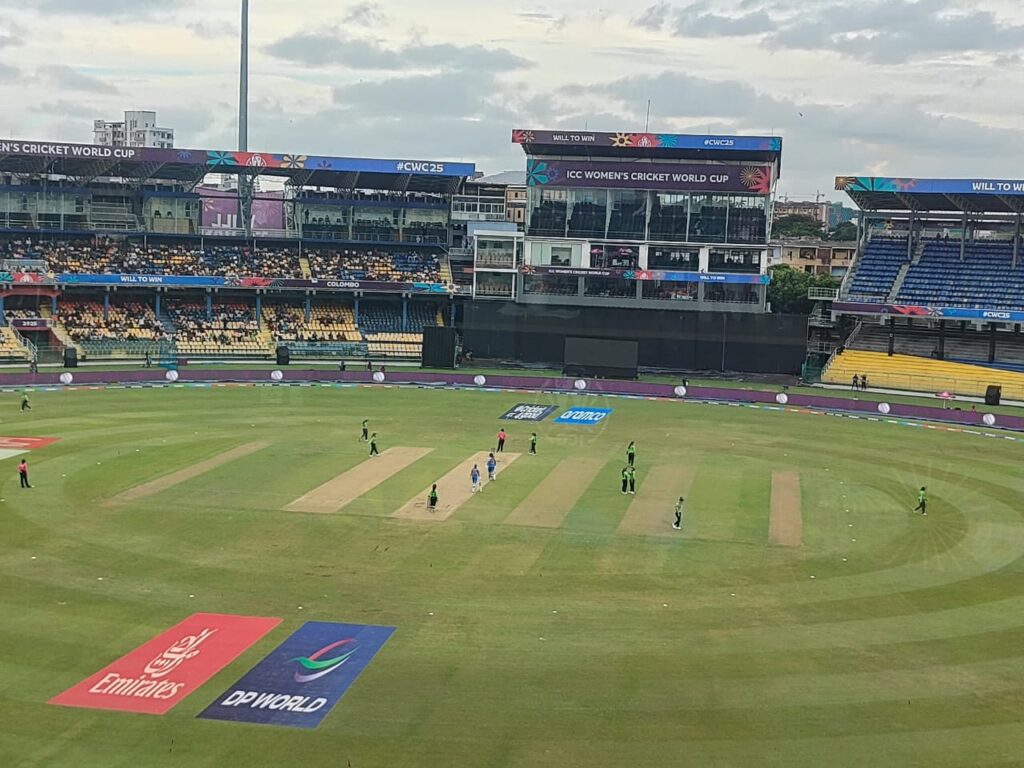
Snehasis Mukherjee in Colombo
India posted 247 against Pakistan in their second game of the ICC Women’s Cricket World Cup after being asked to bat first. However, controversy began right at the toss. Video clips went viral where Pakistan skipper Fatima Sana was heard calling “tails”, but the coin landed on “heads”. Surprisingly, Match Referee Shandre Fritz appeared to mishear Fatima and ruled that Pakistan had won the toss. They chose to bowl. The question remains — if that was the case, why didn’t India skipper Harmanpreet Kaur raise any objection? But the real concern for India began after that.
Two matches into the competition, India’s batting continues to struggle. Against Sri Lanka, they were 124/6 before Amanjot Kaur and Deepti Sharma rescued them to take the team past 260.
Today, on a typical R Premadasa surface, spinners were always going to play a role. But since the start, Indian batters — Smriti Mandhana, Pratika Rawal, Harleen Deol, Harmanpreet Kaur and Jemimah Rodrigues — struggled to judge the pace of the wicket.
Pakistan’s bowlers stuck to the basics, maintaining wicket-to-wicket lines and smartly varying their pace. Pratika’s dismissal (31 off 37) showed that perfectly. Sadia Iqbal bowled repeatedly outside off stump, and Pratika kept cutting. She hit one straight to the fielder, then found a gap for four. The very next ball, a faster one at 84 kmph (compared to 76 kmph earlier), went on to hit the off stump.
Mandhana’s World Cup campaign is yet to lift off. After a strong ODI series against Australia, she’s now had two failures in a row. Oppositions have a clear plan — give her no room early, dry up the boundaries, and wait for the mistake. Today, Fatima Sana trapped her LBW for 23 (32).
Harleen scored 46 (65) while Harmanpreet managed 19 (34) before a sharp catch by Sidra Nawaz ended her stay. All Indian batters faced the same issue — strike rotation. This has become a pattern. When teams bowl tight lines and field well, India’s batters often fail to keep the scoreboard ticking. Same shots, same areas, same results — no effort to look for singles or twos.
For More Exciting Articles: Follow RevSportz
Jemimah Rodrigues, out for a golden duck in the opener, got a second chance after Diana Baig over-stepped. But she again failed to convert, dismissed for 32 (37).
On a slowish pitch, with Pakistan bowling disciplined lines, none of India’s top five scored a fifty — a big concern. Pakistan missed some chances to tighten the grip, but stronger teams will not.
India’s management then promoted Sneh Rana ahead of Richa Ghosh. Rana, who played a handy cameo against Sri Lanka, looked scratchy today with 20 (33). Deepti Sharma, the previous match’s Player of the Match, also struggled, scoring 25 (33). Richa finally added quick runs at the end with an unbeaten 35 off 20.
However, her late entry surprised many. She could have added more had she come earlier. Also, her single off the third ball of the final over raised questions over game awareness.
Overall, India’s innings lacked intent. Though they’ve beaten Pakistan in all 11 previous WODIs, they’ve crossed 250 only thrice while batting first — the last time being in 2008 at Dambulla.
This total might still be enough against Pakistan if bowlers deliver. But against stronger teams ahead, such mistakes can hurt badly and derail India’s World Cup campaign.

Also Read: CWC 2025: India aim to make it 12-0 against Pakistan amid rain threat over crucial match




